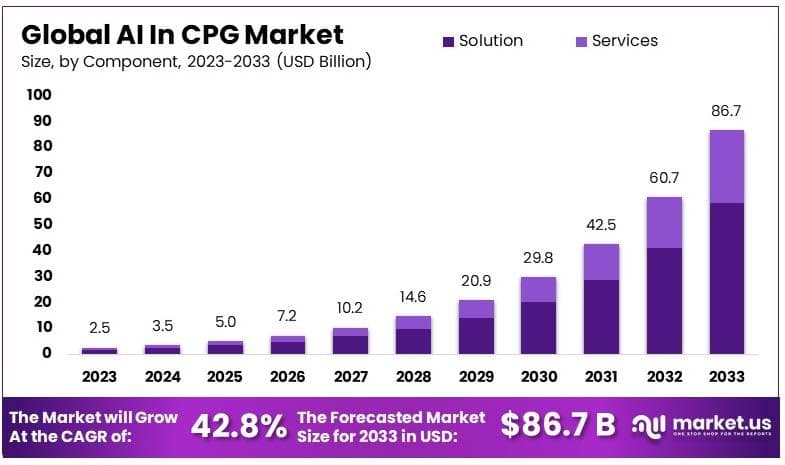Introduction
The Global AI in CPG Market is set for exceptional growth as consumer goods companies increasingly adopt artificial intelligence to enhance supply chain efficiency, demand forecasting, and personalized marketing. Valued at USD 2.46 Billion in 2023, the market is expected to reach nearly USD 86.7 Billion by 2033, advancing at a CAGR of 42.80% between 2024 and 2033.
AI in the Consumer Packaged Goods (CPG) market refers to the use of artificial intelligence technologies to optimize various aspects of CPG business operations. These include product development, supply chain management, marketing, and consumer insights. AI helps companies process large volumes of data to make smarter decisions, predict demand accurately, streamline operations, and tailor products and marketing to consumer preferences, enabling more agile and efficient business models. The integration of AI transforms traditional CPG functions into digital, responsive systems that support better business outcomes in a competitive environment.
The top driving factors for AI adoption in the CPG market center around improving supply chain efficiency, enhancing customer experience, promoting product innovation, and reducing operational costs. AI’s ability to analyze consumer data and predict demand accurately improves inventory management, reduces waste, and ensures products are available when needed. Personalized marketing campaigns driven by AI increase engagement and sales. Furthermore, AI supports faster product development cycles by identifying emerging consumer trends and preferences early on.

Key Insight Summary
- The AI in CPG Market was valued at USD 2.46 Billion in 2023 and is projected to reach USD 86.7 Billion by 2033, registering a strong 42.8% CAGR.
- The Solutions segment dominated in 2023 with 67.5% share, driven by demand for AI tools that improve efficiency and decision-making.
- Supply Chain Optimization was the leading application, capturing 35.1% share, as companies focus on faster deliveries, cost reduction, and operational efficiency.
- North America led the global market in 2023 with 39.7% share, supported by advanced AI adoption and heavy regional investments in infrastructure.
Analysts’ Viewpoint
Investment opportunities in AI for the CPG market are expanding due to the increasing recognition of AI’s value across all business areas. Investments focus on AI-powered demand forecasting, supply chain automation, personalized marketing platforms, and AI governance frameworks. Emerging technologies like generative AI and collaborative AI integrations offer new avenues for innovation and efficiency. The expansion of AI adoption among small and medium enterprises as well as development of industry-specific AI tools present growing areas for investment.
Business benefits from AI in the CPG sector are substantial. Companies experience enhanced cost efficiency by automating processes, improved speed to market through agile product development, and better consumer alignment via data-driven insights. AI-driven tools improve collaboration across departments, reduce risks associated with new product launches, and increase revenue through personalized consumer experiences. These benefits collectively improve competitiveness and resilience in the fast-moving consumer goods landscape.
The regulatory environment around AI in CPG focuses on responsible AI governance to ensure ethical use, data security, and compliance with industry standards. Effective AI governance frameworks include defining clear purposes for AI initiatives, fostering a culture of accountability, implementing governance policies, and continuously assessing AI project outcomes. The regulatory focus also emphasizes transparency, minimizing bias, and securing consumer data, which are crucial for sustaining trust and maximizing AI’s value in CPG businesses.
Regional Analysis
In 2023, North America led the market, accounting for more than 39.7% of the share and generating about USD 0.97 Billion in revenue. The region’s leadership is supported by strong digital adoption, advanced retail ecosystems, and early integration of AI across major CPG players to drive innovation and competitive advantage.

Driver Analysis
Enhanced Demand Forecasting and Operational Efficiency
The adoption of AI in the Consumer Packaged Goods (CPG) industry is significantly driven by its ability to improve demand forecasting and operational efficiency. AI technologies analyze vast amounts of consumer data and market trends with precision, enabling companies to predict consumer demand more accurately.
This helps in reducing costly inventory overstocking or stockouts that disrupt supply chains. With AI-powered forecasting tools, businesses can optimize inventory management, streamline production planning, and respond faster to market changes, thus lowering operational costs and improving customer satisfaction by ensuring products are available when needed.
Moreover, AI automates many routine processes, freeing human resources for more strategic tasks. Companies use machine learning algorithms and predictive analytics not only to make informed decisions but also to identify emerging consumer trends. This transformation from traditional methods to intelligent AI-driven operations allows CPG companies to become more agile and responsive, sustaining competitive advantage in a fast-evolving market environment. This makes enhanced operational efficiency one of the strongest drivers for AI integration in the CPG sector.
Restraint Analysis
High Implementation Costs and Data Privacy Concerns
One major restraint slowing down AI adoption in the CPG sector is the high cost of implementing AI solutions. Investing in AI technology requires significant capital outlay for infrastructure, software, and skilled personnel. Smaller and medium-sized companies often struggle with these upfront costs, which can be a barrier to entry despite the potential long-term benefits. Besides financial considerations, integrating AI into existing legacy systems can be complex and time-consuming, posing further challenges.
Data privacy concerns also restrict AI deployment. CPG companies handle vast amounts of sensitive consumer data, and the use of AI heightens the risk of data breaches or misuse. Regulatory compliance regarding personal data protection adds another layer of complexity. These concerns necessitate strict governance and security measures that add cost and operational friction. As a result, many CPG firms remain cautious in fully embracing AI, slowing overall market growth.
Opportunity Analysis
Personalization and Consumer Engagement
AI presents a significant opportunity for CPG companies to enhance personalization and deepen consumer engagement. By leveraging AI-powered analytics, companies can better understand individual consumer preferences through behavior analysis and social media insights. This capability allows the creation of targeted and relevant marketing campaigns, increasing the effectiveness of promotions and product recommendations.
Personalized consumer experiences foster stronger brand loyalty and higher sales conversion rates. AI can also simulate product development scenarios, creating innovations that resonate with consumer needs faster and more cost-effectively. As consumers increasingly seek unique and tailored product interactions, CPG firms that harness AI for personalization can differentiate themselves and capture greater market share, making this a critical growth opportunity.
Challenge Analysis
Fragmented Data and Workforce Adaptation
A key challenge facing AI adoption in the CPG industry is the fragmentation and underutilization of data. Many companies operate with siloed data sources that limit the holistic application of AI insights. Poor data quality and lack of integration across platforms hinder the effectiveness of AI models. This fragmentation requires significant effort and technology investment to cleanse, consolidate, and manage data for AI applications.
Additionally, workforce adaptation poses a barrier. Employees in CPG firms often lack the necessary skills to work alongside AI systems effectively, requiring training and change management initiatives. Resistance to AI-driven automation may arise due to fear of job displacement. Overcoming these human and technical hurdles is essential for deploying AI at scale and reaping its full benefits in driving smarter decision-making and operational improvements.
Key Market Segments
By Component
- Solution
- Services
By Application
- Supply Chain Optimization
- Demand Forecasting
- Product Development
- Marketing & Advertising
- Other Applications
Top Key Players in the Market
- IBM Corporation
- SAP SE
- Oracle Corporation
- Microsoft Corporation
- Google LLC
- Salesforce, Inc.
- Adobe Inc.
- NVIDIA Corporation
- Accenture plc
- DataRobot, Inc.
- Other Key Players











